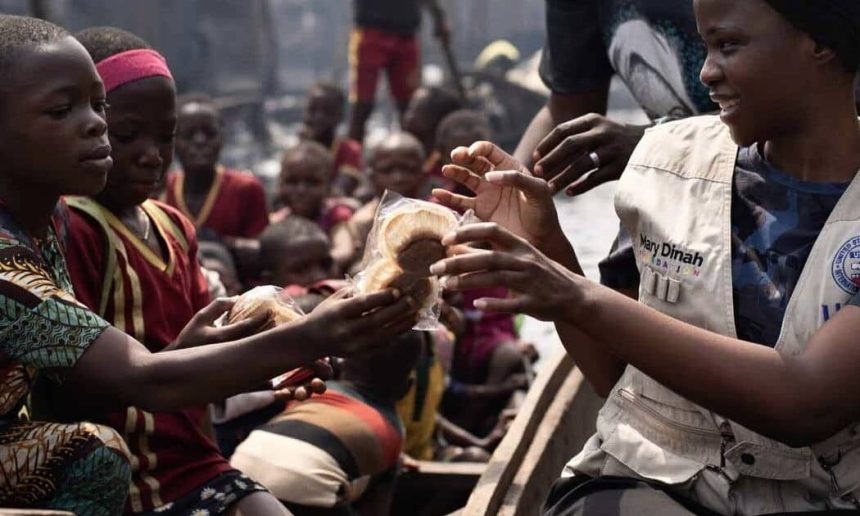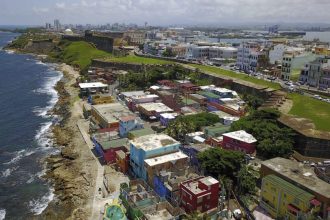A non-governmental organisation, the Mary Dinah Foundation, has announced the dispatch of lifesaving nutrition supplies, totalling over 12 million therapeutic meals, to some of the most conflict-ravaged communities across West and Central Africa.
It said the shipment will support 102,000 individuals enrolled in MDF’s flagship Zero Hunger Programme.
The foundation, one of Africa’s leading non-governmental organisations focused on fighting malnutrition and protecting maternal and child health, confirmed in a statement on Thursday, that a shipment of 13 40-foot sea containers carrying 18,180 cartons of specialised nutritious foods had left New York, United States, bound for Yobe State in Nigeria, the Minawao Refugee Camp in Cameroon’s Far North Region, and the Lac Province in Chad.
The statement, signed by Jerry Ezike, Regional Nutrition Director of the Mary Dinah Foundation, noted that these regions had endured years of insurgency, forced displacement, and economic collapse, leaving communities dangerously dependent on humanitarian assistance.
He said the development is a major relief intervention following a partial restoration of U.S. aid.
The statement read, “The Mary Dinah Foundation, one of Africa’s leading non-governmental organisation, dedicated to preventing malnutrition and improving maternal and child health through the provision of specialised nutritious foods, after months of restructuring, has successfully dispatched 13 40-foot sea containers of lifesaving nutrition supplies from New York, USA, to some of the most crisis-affected communities in West and Central Africa.
“A total of 18,180 cartons are being delivered to three frontline locations: Yobe State in North-East Nigeria, the Minawao Refugee Camp in Cameroon’s Far North Region, and the Lac Province of Chad.
“The shipment supports 102,000 individuals enrolled in MDF’s flagship Zero Hunger Program, providing over 12 million therapeutic meals, enough to sustain tens of thousands of women and children through the lean season.”
According to Ezike, the Zero Hunger Programme was one of the few humanitarian interventions preserved after USAID announced the closure of over 5,000 global programmes earlier this year.
“USAID maintained support for the Zero Hunger Programme because of its critical, lifesaving role in ensuring mothers and children stay alive,” the statement read.
The delivery, which amounts to more than 12 million therapeutic meals, marks the start of a complex humanitarian logistics operation involving customs clearance, coordinated ground transport, and final distribution through local health centres and hard-to-reach communities.
Once on the ground, the nutrition supplies will provide vital micronutrients to pregnant and lactating mothers while helping to treat and prevent malnutrition in children under two years old.
Ezike explained that MDF teams, many of whom are from conflict-affected areas themselves, will work with local health workers to ensure that every carton reaches those most in need.
“The delivery marks the start of a major logistics operation involving coordinated sea and land transport, customs clearance, and last-mile delivery to health centres and remote distribution sites.
“Once in-country, the nutrition supplies will deliver essential micronutrients to pregnant and lactating mothers, while also helping to treat and prevent malnutrition in children under two years of age. MDF teams, many of whom come from conflict-affected communities themselves, work hand in hand with local health workers to ensure that every carton reaches those most in need.
“In the face of ongoing conflict threatening millions in north-east Nigeria, northern Cameroon, and Chad, the successful delivery of these 10 million meals stands as a testament to MDF’s resilience and the power of partnership between local communities, international donors, and humanitarian actors.”
According to humanitarian agencies, more than 30 million people across north-east Nigeria, northern Cameroon, and Chad face severe food insecurity, made worse by continued violence and climate-related shocks.
Ezike stressed that the scale of this shipment was a testament to the partnership between local communities, donors, and humanitarian agencies.
“Our mission is simple: to make sure no mother or child dies of hunger,” he said. “We are committed to saving lives, restoring hope, and building food-secure futures.
“With the Zero Hunger Program reaching over 12 million vulnerable people, MDF reaffirms its unwavering commitment to saving lives, restoring hope, and building food-secure futures across the region,” the statement concluded.









